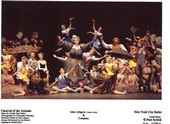|
 |
|
|
 |
 |
New York City Ballet - Donizetti Variations, Agon, Carnival of the Animals(www.nycballet.org)
(See previous New York City Ballet reviews and interviews) presented at the New York State Theater at Lincoln Center By Robert Abrams
May 18, 2003 Donizetti Variations Music by Gaetano Donizetti from Don Sebastian.
Choreography by George Balanchine.
Costumes by Karinska.
Lighting by Mark Stanley.
Conductor: Maurice Kaplow. Danced by Yvonne Borree, Nikolaj Hübbe, Dena Abergel, Amanda Edge, Pauline Golbin, Dana Hanson, Carrie Lee Riggins, Elizabeth Walker, Antonio Carmena, Darius Crenshaw and Adam Hendrickson. - *
Dancers etched from blue semi-precious stone
Legs etch the air
Reverberates with the strings Men who flutter in the air
Frolic beside the river
Pink stones skipping across a river bed Shimmer like a borealis, Borree
Delicate colors leap serpentine to swoon with confidence and full control
Her quick leg work reminded him of the village in which he was born A perfect day
Bring out your joy
The river will never tell - *
Agon Music by Igor Stravinsky.
Choreography by George Balanchine.
Lighting by Mark Stanley.
Conductor: Maurice Kaplow. Dancers: Maria Kowroski, Jock Soto, Jennie Somogyi, Peter Boal, Dana Hanson, Jason Fowler, Deanna McBrearty, Stephen Hanna, Dara Johnson, Rebecca Krohn, Savannah Lowery, Teresa Reichlen. The dancers inhabited the space. Jock Soto was intense and solid. Among much else, this dance features a series of great positions in which the men provide support to their partners both standing, kneeling and on the ground. Having been to the Chamber Dance Project open rehearsal, it is clear that the standing and kneeling support positions could derive from classical partnering technique, while the lying on the ground support positions are clearly from contemporary partnering technique. Agon is one of the favorite works of the person who was sitting next to me. He makes sure to see Agon every year. Having now seen it twice, I agree with him that it is worth seeing. The program notes say that Agon has no musical or choreographic subject beyond a new interpretation of venerable dances, and it certainly looks like a classic leotard ballet in which the dance is danced for its own sake without a narrative, but the image of a lek leapt to my mind, at least in the first section. I could have sworn that the men were expressing a combination of competition for the ballerinas as well as mutual self interest. Recent studies in the field of biology have shown that leks, "dancing competitions" held annually by certain species of birds, not only serve the purpose of helping the females choose a mate, but also serve the self-interest of males who do not get to mate because safety in numbers helps protect them from predation. Sometimes a male of one lekking species will join the lek of another species. The evidence suggests they do this because it is better to be among strangers than to be alone. They are more likely to see or hear predators in time in a group, what ever the group may be. So the next time you are at the ballet and you see a hip hop dancer on stage, you will be able to make an intelligent guess as to why he is there. Carnival of the Animals (See previous review for more raves about this dance and the full cast.) This afternoon's performance was attended by a noticeably large number of small children. Their voices were clearly audible at many points during the ballet. Their happy laughter rang out during the dance of the chickens. There was a lot of laughter during the turtles' can-can, as well as when the elephant turned to reveal John Lithgow. Mr. Lithgow has a way of being comical and silly while giving a little smile that lets the audience know he knows he is being silly. By letting the audience into his craft, he enables the audience to laugh while simultaneously taking seriously the idea he is expressing. The wrestling team got a laugh, especially when they fell into each others arms. The fossils got a laugh, which could have either been from the costumes and their intentionally exaggerated attitude, or from the music of the xylophone (which, when you think about it, looks a lot like the bones of a brontosaurus' rib cage). The adults in the audience were laughing too. On a more serious note, I noticed the smooth transition in the lighting design at the beginning from John Lithgow's flashlight to the stage lights. This performance marked the return to the stage of Ashley Bouder after a period of recovery from an injury. Ashley danced the part of a tropical bird/cheerleader. All of the tropical birds were very forceful and present. The partnering in the Cuckoo section gave the sense that Oliver's mother can not dance alone or go on alone. This emotion is exactly what Kyra Nichols and James Fayette are called upon to convey. At the end of the performance, the audience gave the dancers truly raucous applause. From the smile on the dancers' faces during the bows, one could tell that Carnival of the Animals clearly makes the dancers as happy as it makes the audience. 
Ballet: Carnival of the Animals
Choreography: Christopher Wheeldon
Rachel Rutherford and Pascale Van Kipnis
Photo courtesy of Paul Kolnik

Ballet: Carnival of the Animals
Choreography: Christopher Wheeldon
PJ Verhoest and Arch Higgins
Photo courtesy of Paul Kolnik

Ballet: Carnival of the Animals
Choreography: Christopher Wheeldon
John Lithgow, guest artist, and company
Photo courtesy of Paul Kolnik
|
|
|




